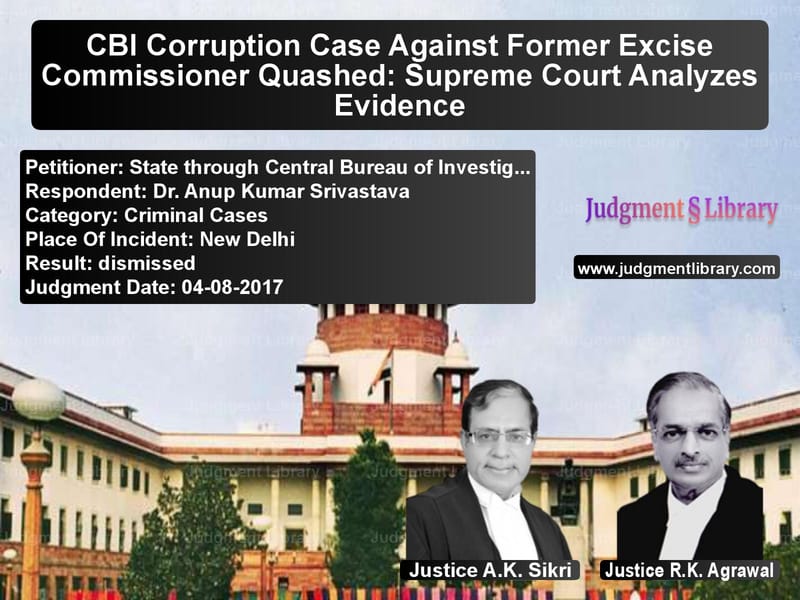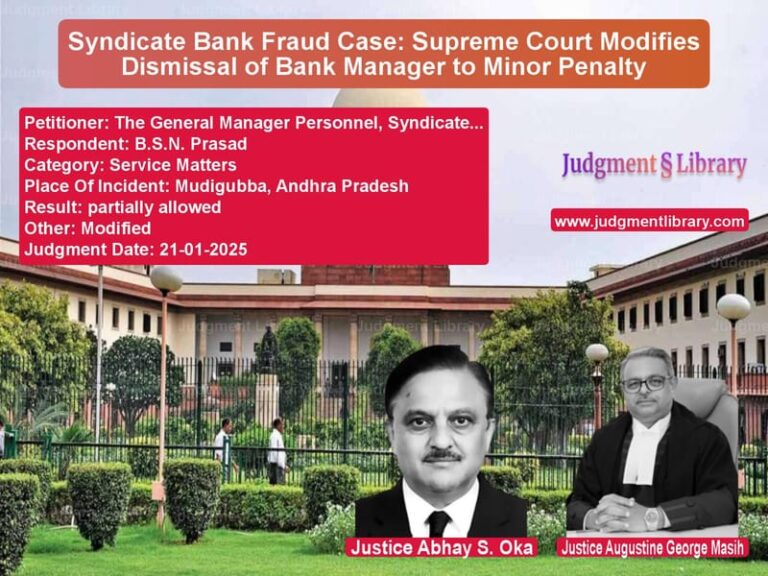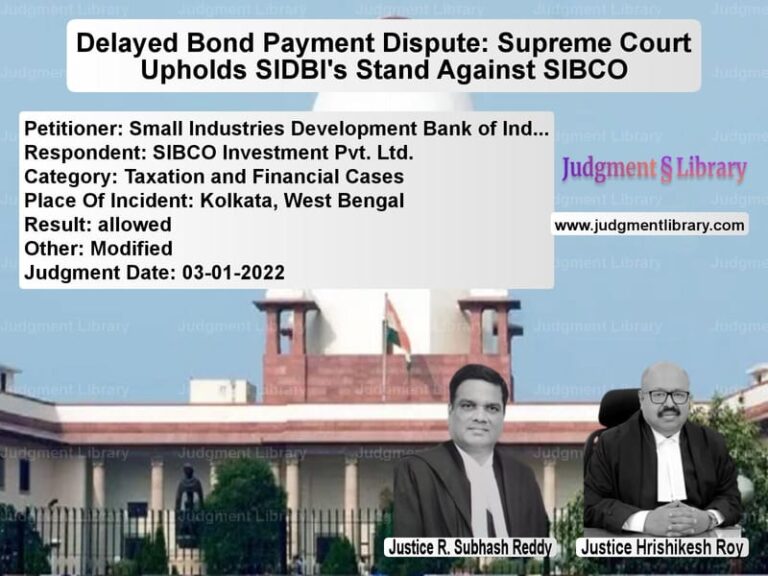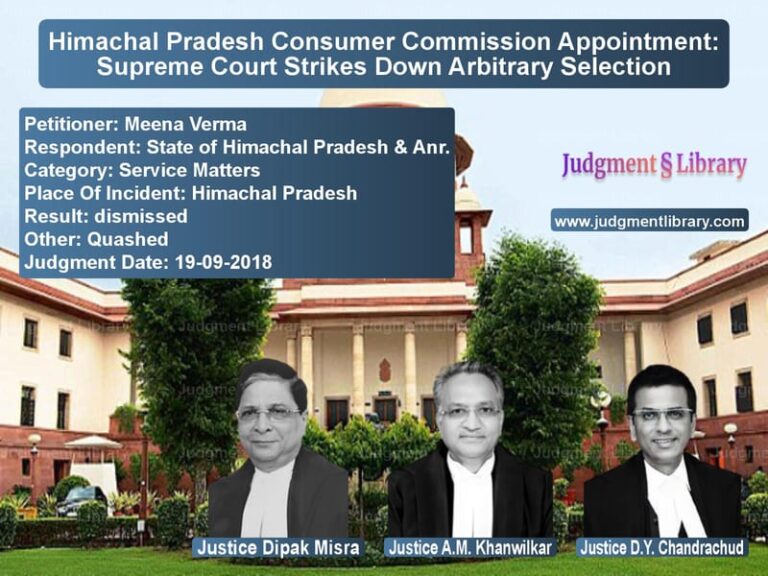CBI Corruption Case Against Former Excise Commissioner Quashed: Supreme Court Analyzes Evidence
The case of State through Central Bureau of Investigation vs. Dr. Anup Kumar Srivastava revolved around serious allegations of corruption and conspiracy within the Central Excise Department. The Supreme Court was tasked with determining whether the charges framed against the respondent, Dr. Anup Kumar Srivastava, were sustainable or if the case against him should be quashed due to lack of substantive proof.
The case began when the Central Bureau of Investigation (CBI) registered a case under multiple sections of the Prevention of Corruption Act, 1988, and the Indian Penal Code. The CBI alleged that Dr. Srivastava, who was serving as Commissioner of Central Excise, colluded with other department officials and a private individual, Hemant Gandhi, to extort a bribe of ₹60 lakhs from business owners during an illegal raid in New Delhi.
Background of the Case
The CBI’s case was built on intercepted telephonic conversations and witness statements. According to the CBI, a team led by Superintendent Lallan Ojha raided the premises of business owners Dilip Aggarwal and Anand Aggarwal on December 28, 2011. During this operation, Hemant Gandhi acted as a middleman to negotiate a bribe in exchange for not taking legal action against the business owners. The alleged amount settled for this illegal favor was ₹60 lakhs.
The prosecution argued that Dr. Srivastava was in direct contact with Hemant Gandhi and was actively involved in coordinating the demand and settlement of the bribe amount. The CBI presented phone call recordings as evidence, alleging that the phrases “mission successful” and “six zero” were codes used to communicate the success of the bribery transaction.
Arguments Presented
CBI’s Arguments
The CBI presented the following arguments in favor of framing charges against Dr. Srivastava:
- The intercepted phone conversations clearly showed that Dr. Srivastava was aware of and involved in the bribery negotiations.
- Witness statements confirmed that the accused was in regular contact with the middleman and other officials.
- Quashing the charges against him would weaken the prosecution’s case against the other accused persons.
- The Special Court had correctly framed the charges based on the evidence available.
Respondent’s Arguments
Dr. Srivastava’s defense countered these allegations with the following arguments:
- There was no direct evidence linking him to the demand or receipt of the bribe.
- The intercepted calls contained ambiguous language and could not conclusively prove criminal intent.
- The witnesses who initially implicated him later retracted their statements, alleging coercion by investigators.
- The High Court had rightly quashed the charges after examining the lack of substantial evidence.
Supreme Court’s Observations
The Supreme Court scrutinized the evidence presented, particularly the call recordings that formed the backbone of the CBI’s case. The Court stated:
“A bare perusal of the above call, prima facie, shows that the respondent herein was not at all in picture and even in Call No. 51 he was talking to Hemant Gandhi, but it is not proved that they were talking about the same raid as they have used certain other cryptic codes.”
Furthermore, the Court emphasized that conspiracy charges require strong circumstantial evidence:
“There is no material evidence on record to bring home the charge of conspiracy against the respondent. There is no direct or circumstantial evidence to prove that the respondent has demanded any illegal gratification and has accepted or obtained any such illegal gratification.”
Legal Precedents and Analysis
The Court referred to established legal principles regarding conspiracy and bribery under the Prevention of Corruption Act. It reiterated that mere possession of incriminating communication was insufficient to establish guilt. The Court also noted:
“The proof of demand of illegal gratification, thus, is the gravamen of the offence under Sections 7 and 13(1)(d)(i) and (ii) of the Act and in absence thereof, unmistakably the charge therefor, would fail.”
The Court stressed that suspicion or indirect involvement was not enough to convict a person under these provisions. It ruled that:
“Mere acceptance of any amount allegedly by way of illegal gratification or recovery thereof, dehors the proof of demand, ipso facto, would thus not be sufficient to bring home the charge under these two sections of the Act.”
Final Judgment
The Supreme Court upheld the High Court’s decision to quash the charges against Dr. Srivastava, stating:
“In view of the foregoing discussion, the appeal filed by the CBI is liable to be dismissed and is, accordingly, dismissed.”
The Court clarified that its decision applied only to Dr. Srivastava, and the trial against the other accused would continue.
Implications of the Judgment
This ruling has significant implications for future corruption cases, particularly regarding the evidentiary standards required for framing charges. The Supreme Court’s decision reinforces the principle that criminal charges must be backed by concrete evidence rather than circumstantial suspicion.
Legal experts have pointed out that this judgment may serve as a benchmark for similar cases where evidence primarily consists of intercepted communications. The ruling ensures that procedural safeguards against wrongful prosecution are upheld while also emphasizing the need for a robust investigative process.
Don’t miss out on the full details! Download the complete judgment in PDF format below and gain valuable insights instantly!
Download Judgment: State through Centra vs Dr. Anup Kumar Sriva Supreme Court of India Judgment Dated 04-08-2017.pdf
Direct Downlaod Judgment: Direct downlaod this Judgment
See all petitions in Fraud and Forgery
See all petitions in Money Laundering Cases
See all petitions in Extortion and Blackmail
See all petitions in Judgment by A.K. Sikri
See all petitions in Judgment by R K Agrawal
See all petitions in dismissed
See all petitions in supreme court of India judgments August 2017
See all petitions in 2017 judgments
See all posts in Criminal Cases Category
See all allowed petitions in Criminal Cases Category
See all Dismissed petitions in Criminal Cases Category
See all partially allowed petitions in Criminal Cases Category







